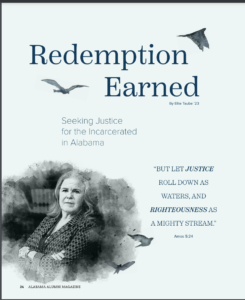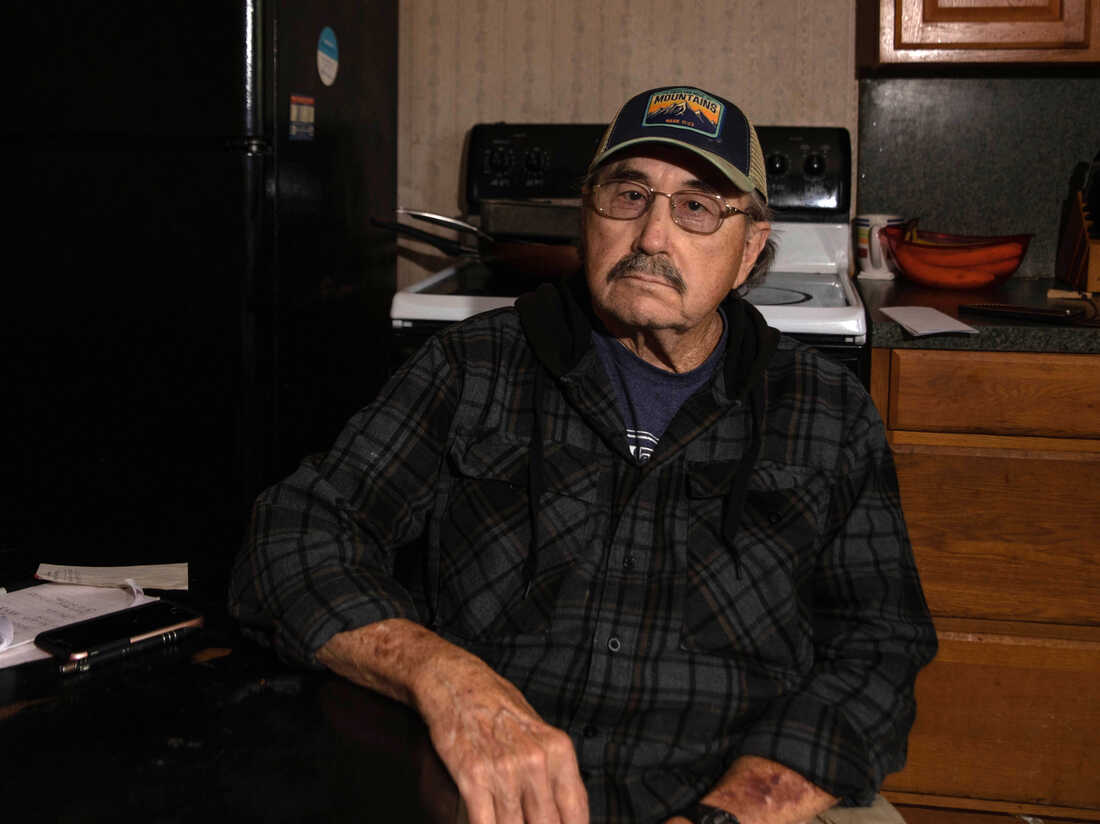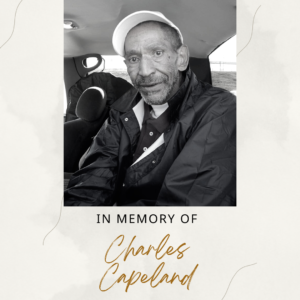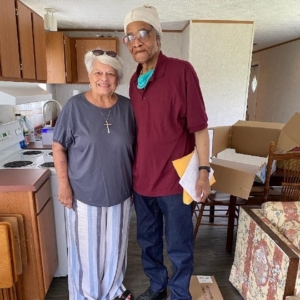Redemption Earned: Alabama Alum Magazine
Redemption Earned was featured in the University of Alabama Alum Magazine. See at the link below.

Redemption Earned was featured in the University of Alabama Alum Magazine. See at the link below.

By
Fred Clasen-Kelly (NPR News)

Charity Rachelle/KFF Health News
After spending 38 years in the Alabama prison system, one of the most violent and crowded in the nation, Larry Jordan feels lucky to live long enough to regain his freedom.
The decorated Vietnam War veteran had survived prostate cancer and hepatitis C behind bars when a judge granted him early release late last year.
“I never gave up hope,” says Jordan, 74, who lives in Alabama. “I know a lot of people in prison who did.”
At least 6,182 people died in state and federal prisons in 2020, a 46% jump from the previous year, according to data recently released by researchers from the UCLA Law Behind Bars Data Project.
“During the pandemic, a lot of prison sentences became death sentences,” says Wanda Bertram, a spokesperson for the Prison Policy Initiative, a nonprofit that conducts research and data analysis on the criminal justice system.
Now, Jordan worries about his longevity. He struggles with pain in his legs and feet caused by a potentially life-threatening vascular blockage, and research suggests prison accelerates the aging process.
Life expectancy fell in the United States in 2021 for the second year in a row, according to the Centers for Disease Control and Prevention. That decline is linked to the devastating effect of covid-19 and a spike in drug overdoses.
Some academic experts and activists say the trend also underscores the lasting health consequences of mass incarceration in a nation with roughly 2 million imprisoned or jailed people, one of the highest rates in the developed world.
A Senate report last year found the U.S. Department of Justice failed to identify more than 900 deaths in prisons and local jails in fiscal year 2021. The report said the DOJ’s poor data collection and reporting undermined transparency and congressional oversight of deaths in custody.
Thousands of people like Jordan are released from prisons and jails every year with conditions such as cancer, heart disease, and infectious diseases they developed while incarcerated. The issue hits hard in Alabama, Louisiana, and other Southeastern states, which have some of the highest incarceration rates in the nation.
A major reason the U.S. trails other developed countries in life expectancy is because it has more people behind bars and keeps them there far longer, says Chris Wildeman, a Duke University sociology professor who has researched the link between criminal justice and life expectancy.
“It’s a health strain on the population,” Wildeman says. “The worse the prison conditions, the more likely it is incarceration can be tied to excess mortality.”
Mass incarceration has a ripple effect across society.
Incarcerated people may be more susceptible than the general population to infectious diseases such as covid and HIV that can spread to loved ones and other community members once they are released. The federal government has also failed to collect or release enough information about deaths in custody that could be used to identify disease patterns and prevent fatalities and illness inside and outside of institutions, researchers says.
Over a 40-year span starting in the 1980s, the number of people in the nation’s prisons and jails more than quadrupled, fueled by tough-on-crime policies and the war on drugs.
Federal lawmakers and states such as Alabama have passed reforms in recent years amid bipartisan agreement that prison costs have grown too high and that some people could be released without posing a risk to public safety.
The changes have come too late and not gone far enough to curb the worst effects on health, some researchers and activists for reform say.
Still, no one has proven that incarceration alone shortens life expectancy. But research from the early 2000s did show the death rate for people leaving prison was 3.5 times higher than for the rest of the population in the first few years after release. Experts found deaths from drug use, violence, and lapses in access to health care were especially high in the first two weeks after release.
Another study found that currently or formerly incarcerated Black people suffered a 65% higher mortality rate than their non-Black peers. Black people also make up a disproportionately high percentage of state prison populations.
The enactment in 2000 of the Death in Custody Reporting Act, and its reauthorization in 2014, required the DOJ to collect information about deaths in state and local jails and prisons.
The information is supposed to include details on the time and location of a death, demographic data on the deceased, the agency involved, and the manner of death.
But a recent report from the Government Accountability Office found that 70% of the records the DOJ received were missing at least one required data point. Federal officials also lacked a plan to take corrective action against states that didn’t meet reporting requirements, the GAO found.
The deficiency in data means the federal government can’t definitively say how many people have died in prisons and jails since the covid-19 pandemic began, researchers say.
“Without data, we are operating in the dark,” says Andrea Armstrong, a professor at the Loyola University New Orleans College of Law, who has testified before Congress on the issue.
Armstrong says federal and state officials need the data to identify institutions failing to provide proper health care, nutritious food, or other services that can save lives.
The DOJ did not make officials available for interviews to answer questions about the GAO report.
In a written statement, agency officials said they were working with law enforcement and state officials to overcome barriers to full and accurate reporting.
“The Justice Department recognizes the profound importance of reducing deaths in custody,” the statement said. “Complete and accurate data are essential for drawing meaningful conclusions about factors that may contribute to unnecessary or premature deaths, and promising practices and policies that can reduce the number of deaths.”
Department officials said the agency is committed to enhancing its implementation of the Death in Custody Reporting Act and that it has ramped up its efforts to improve the quality and quantity of data that it collects.
The DOJ has accused Alabama, where Jordan was incarcerated, of failing to adequately protect incarcerated people from violence, sexual abuse, and excessive force by prison staff, and of holding prisoners in unsanitary and unsafe conditions.
One of the longest sentences in Alabama history

Larry Jordan, a Vietnam War veteran, survived prostate cancer, hepatitis C, and a potentially life-threatening vascular blockage while incarcerated in Alabama.
Charity Rachelle /KFF Health News
Jordan served 38 years of a 40-year sentence for reckless murder stemming from a car accident, which his lawyer argued in his petition for early release was one of the longest sentences in Alabama history for the crime. A jury had found him guilty of being drunk while driving a vehicle that crashed with another, killing a man. If he were convicted today instead, he would be eligible to receive a sentence as short as 13 years behind bars, because he has no prior felony history, wrote Alabama Circuit Judge Stephen Wallace, who reviewed Jordan’s petition for early release.
With legal help from Redemption Earned, an Alabama nonprofit headed by a former state Supreme Court chief justice, Jordan petitioned the court for early release.
On Sept. 26, 2022, Wallace signed an order releasing Jordan from prison under a rule that allows Alabama courts to reconsider sentences.
A few months later, Jordan says, he had surgery to treat a vascular blockage that was reducing blood flow to his left leg and left foot. A picture shows a long surgical scar stretching from his thigh to near his ankle.
The Alabama Department of Corrections refused an interview request to answer questions about conditions in the state’s prisons.
Jordan says his vascular condition was excruciating. He said he did not receive adequate treatment for it in prison: “You could see my foot dying.”
KFF Health News, formerly known as Kaiser Health News (KHN), is a national newsroom that produces in-depth journalism about health issues and is one of the core operating programs at KFF — the independent source for health policy research, polling, and journalism.
On Friday, November 18th around 9am, Charles Copeland became a free man (See video above of his release). After serving 32-years in prison he was finally able to go home with his family who arrived from Georgia to pick him up. This moment was bittersweet. Mr. Copeland who was suffering from stage four liver cancer succumbed to his illness on January 18th, at the age 68. We are saddened that he was only allowed such a short time as a free man but also celebrate that he was able to spend his last holiday season and the last few days of his life held in the arms of his loved ones instead of the walls of prison.
Redemption Earned Staff attorney, Darrius Culpepper, was privileged to witness Mr. Copeland’s release from St. Clair Correctional Facility.
Culpepper said, “Even though Mr. Copeland was dying of liver cancer, I was touched by his earnest offer to aid us in helping those in a similar position to himself.”
The fact remains that many of our citizens of Alabama currently being held in prisons must suffer a worse fate—dying behind those walls, isolated from family and the support of the faith community.
We are thankful to celebrate that Mr. Copeland was given the gift of a humane passing due to the work of Redemption Earned to get him compassionately released.
Please, join us in sending prayers to his family and friends.
To learn more visit us at: www.redemptionearned.org

In 1986, Moses Summerville entered a Taco Bell unarmed and made an unfounded threat in an attempt to obtain money. In response, an employee defended the restaurant by throwing hot grease at Mr. Summerville, causing him to leave the premises and seek medical attention and police intervention. As a result of his actions, he was sentenced to life in prison.
During his 36-year incarceration, Mr. Summerville actively engaged in various rehabilitation programs, earning certificates and striving to improve himself while addressing his psychosis.
Redemption Earned, upon hearing Mr. Summerville’s story, came to believe that he had served enough time for the crime, especially considering he was the only one injured, and that he no longer posed a threat to public safety. As a result, they decided to represent him before the Parole Board.
On May 16th, 2023, the Alabama Board of Pardons and Paroles reviewed Moses Summerville’s case and granted him a second chance at freedom. Nearly a month later, on the day before Independence Day, Mr. Summerville finally breathed the air of freedom after almost 37 years of imprisonment.

Upon his release from Bullock Correctional Facility, Mr. Summerville was met by Reverend Mayer, a retired Episcopalian priest and volunteer for Redemption Earned, along with her neighbor, Taiwan Ferguson. Rev. Mayer described the day as long but ultimately fulfilling.
Initially, Mr. Summerville seemed unsure if he was truly free, even suspecting that he might be transferred to another prison. However, he was delighted to learn that he was heading to Montgomery, where Faith Crusade, a Reentry Program run by Chaplain Curtis Browder and his family, had arranged for him to stay in a trailer with a choice of rooms, access to a stable full of horses, and seventy-five dollars waiting for him.
Leading up to his release, Redemption Earned had coordinated with Faith Crusade to furnish Mr. Summerville’s new living space, providing him with a bed frame, mattress, and other essentials to facilitate his transition.
Rev. Mayer spoke highly of Mr. Summerville, describing him as a courteous, enthusiastic, and appreciative individual who cherishes his family and finds joy in life’s simple pleasures.
The staff at Redemption Earned believes that Mr. Summerville’s story exemplifies the collaborative efforts of not only their team but also volunteers, community partners, and donors in the pursuit of a better Alabama. They advocate for justice, restoration, rehabilitation, and mercy, especially for those who are often overlooked and underserved. The last. The lost.
Your donation is important and keeps the mission of identifying and working for worthy individuals who are eligible for parole. DONATE HERE!
